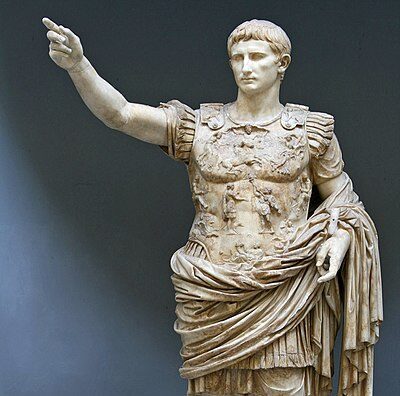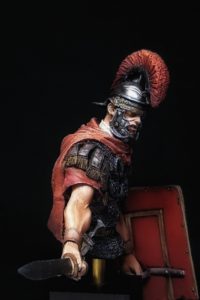
Peter in Roman Sin City
A background behind Caesar’s Palace in Judea
Initially, a few decades before..
Caesarea is sixty some miles northwest of Jerusalem. Herod had expanded it to become one of the most important cities in the Roman Empire, which would later serve Rome as Judea’s capital. (Yes, it would later have a grande Caesar’s Palace intended for the Herodian rulers of Judea.)
Herod the Great had sold his political soul to an alliance with the great Caesar Augustus (title first claimed by Herod’s ally, Octavian). But Herod’s alliance accomplished only a brief stay of execution of Roman dominance over Judea, even as he began many magnificent building projects. These included an incomplete Temple in Jerusalem where Jesus would preach and an opulent port of Caesarea Maritima (one of several Caesar’s Palaces of these times).
Romans, Egyptians and the Greeks before them under the dominance of Alexander’s world empire worshiped MANY gods. Jerusalem’s differing parties of Jews argued constantly over such forced relationships with their pagan overseers. A Caesar or Cleopatra as one of these gods was common occurrence in the A.D. first century world where Jews mostly traded liberally with other cultures.
Caesar’s, Ptolemy’s & Herod’s
You probably know about the whoredom of Cleopatra (glamorized by Hollywood) from when the Queen of Egypt willingly made her bed with the power of Rome in order to hold onto her kingdom. (It’s a complex plot of military/political/religious drama of real life at its best.)
In fact, Jews recognized that the ruling party of the Herod’s was no less in bed with Rome than had been Cleopatra.
She had commanded a personal fleet of 60 ships and sent 200 ships to Antony at Actium [33 B.C.]. This Egyptian Pharaoh also appointed her own governors of conquered regions like Syria and Cypress.
Cleopatra had incited a war against Herod. Octavian later takes power as Caesar Augustus. [See more linked to the quote below.]
Herod, who had personally advised Antony after the Battle of Actium that he should betray Cleopatra, traveled to Rhodes to meet Octavian and resign his kingship out of loyalty to Antony. Octavian was impressed by his speech and sense of loyalty, so he allowed him to maintain his position in Judea, further isolating Antony and Cleopatra.
Wikipedia.org – citing additional sources
Herod’s new harbor of Caesarea was forty acres and could accommodate 300 ships. According to the historian Josephus, he built a “most magnificent palace” on a promontory jutting out into the waters of Caesarea and lengthy aqueduct to bring water from springs at the base of Mount Carmel nearly ten miles away.
Read more & see additional photos: https://www.bibleplaces.com/caesarea/
Enter Peter encountering Rome in Caesarea
In ~ the year of our Lord, 40
Your additions or corrections to this approximate scenario of A.D. 40'ish from various sources are welcome as a COMMENT to this post. - RH
- Joseph ben Caiaphas, who had condemned the Messiah JESUS to a Cross and unsuccessfully tried Peter and John remains powerful in Jerusalem.
- Pontius Pilate had been recalled from office as governor by Tiberius Caesar three years earlier after Pilate had ordered great violence to suppress a Samaritan rebelion.
- Tiberius Caesar Augustus died that same year and was succeeded by his son Caligula, who declared himself a god.
- Caligula ordered a statue of himself is to be erected in the temple at Jerusalem, but Herod delays implementation long enough to prevent widespread revolt in Judaea and prior to Caligula’s assassination by men of a succeeding Emperor, Claudius.
- Herod Antipas, son of Herod the Great & Tetrarch of Galilee and Perea, whose wife Herodias had incited him to behead John the Baptist, has also died just a year earlier.
- AND NOW, The Lord has summoned Simon Peter to accompany three Roman men sent from Caesarea by a Roman military leader to find Peter in Joppa.
ACTS 10: of PETER in Caesarea
CLICK ACTS 10 [above] to view: New American Standard Bible; Conferenza Episcopale Italiana; Orthodox Jewish Bible; SBL Greek New Testament + consider the significance of this crucial cross-cultural visit by Simon Peter to a Roman in Caesarea.
Now on the next day he got ready and went away with them, and some of the brothers from Joppa accompanied him. On the following day he entered Caesarea.
ACTS 10:23b-24a NASB
Now Cornelius was expecting them and had called together his relatives and close friends.
- Peter has brought fellow followers of Christ, fellow jews from Joppa [v.23].
- Cornelius is A devout man, &–an uncircumcised Gentile proselyte to the Jewish faith, of whom there were a very great number at this time; a distinguished proselyte, who had brought his whole household establishment under the hallowing influence of the Jewish faith and the regular observance of its principal seasons of worship. – source
When Peter entered, Cornelius met him, and fell at his feet and worshiped him.
This is more than respect and above customary honor of one man to a delegate coming to him from another place or as a representative of the true faith he seeks.
Cornelius, a Roman Jew in every way except birth and circumcision, recognizes that Peter, is ambassador of the Messiah Jesus, a man of miracles.
Faithful and reliable men have even told him about Peter and his miracles in Jerusalem confirming the Messiah AND Jesus’ anointing of this Apostle who has now come into his presence in his Roman city of Caesarea.
Just like the healed lame man who clung to Peter at the Temple, Cornelius meets a man with the Power of the Lord who gives all credit to the Lord Jesus Christ.
26 But Peter helped him up, saying,
“Stand up; I, too, am just a man.”
27 As he talked with him, he entered and found many people assembled. And he said to them,
“You yourselves know that it is forbidden for a Jewish man to associate with or visit a foreigner;
Just let this sink in for a moment, as Peter’s Roman listeners in Caesarea certainly must have done:
Cornelius may have instructed the men in his command in this manner:
‘These JEWISH subjects of our Roman legions are NOT at all like the tolerant Hellenists we meet throughout Caesar’s Empire! So avoid them when possible.‘
Peter continues with words of comfort to these gentiles:
and yet God has shown me that I am not to call any person unholy or unclean.
That is why I came without even raising any objection when I was sent for.
NEXT:

Cornelius recounts his own ‘coming to Jesus’ experience at Caesar’s Palace East in Caesarea.
To be continued...





